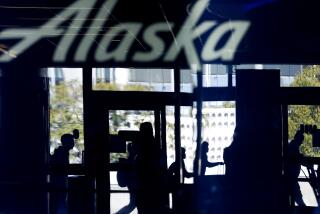British Airways Idles Remaining 7 Concordes
- Share via
Supersonic passenger travel was abruptly halted Tuesday--and some analysts said it might be ended forever--when British Airways grounded its seven Concordes in advance of plans by French and British authorities to rule the exotic jet unfit to fly, at least temporarily.
The action came amid an investigation into a July 25 crash of an Air France Concorde outside Paris that killed 114 people. Air France’s five Concordes, the only other remaining Concordes in service, have been idle since the accident.
British Airways took the action after learning that French and British regulators are expected today to recommend that the Concorde’s airworthiness certificate be suspended, presumably until modifications could be made to the jets in response to data garnered from the crash.
British Airways promptly canceled its Concorde flights and transferred passengers to flights on Boeing 747s on Tuesday, said spokesman John Lampl in New York. The carrier was operating only one daily round-trip flight between London and New York.
“It’s still far too early . . . to speculate on what’s going to happen to Concorde’s [long-term] operations,” Lampl said. “There’s nothing permanent about what we’re doing. But we decided to err on the side of safety and precaution.”
Some analysts, though, said the plane is doomed.
“I don’t think it’s speculation, I think it’s over” for the Concorde, said Michael Boyd, president of the Boyd Group, an aviation consulting firm in Evergreen, Colo.
“To get the [airworthiness] certificate back would take severe modifications, and to modify a 30-year-old design doesn’t make [economic] sense,” he said.
But in a memo to his employees, British Airways Chief Executive Rod Eddington said: “Will the Concorde fly again? I certainly hope so, but only when we and all the appropriate airworthiness authorities are 100% satisfied that Concorde can fly on into the future completely safely.”
Concorde’s future already was in question moments after the Air France jet crashed into a small hotel shortly after takeoff, with flames spewing from its engines. The doubts arose even though Concorde had a relatively good safety record during its 24 years of commercial service, with no prior fatal crashes. The aircraft was manufactured under a joint British-French effort.
And although the airlines say the Concorde is profitable, others say the jetliner--which flies at twice the speed of sound, carries 100 passengers and charges about $10,000 one-way across the Atlantic--is little more than a prestige airplane whose days were numbered.
The Concorde, known for its familiar bird-line appearance and droopy nose, was flown mostly by celebrities, businesspeople and other well-heeled travelers. But with no other supersonic jet even on the drawing board, those passengers would be back to flying conventional jetliners if the Concorde is permanently grounded.
Investigators already have suggested that the crash might have been caused by fire in the plane’s fuel tanks, sparked perhaps by debris from a tire that exploded after hitting a strip of metal left on the Roissy-Charles de Gaulle runway.
An official of Britain’s Civil Aviation Authority, speaking on condition of anonymity, told the Associated Press on Tuesday that the decision to revoke the Concorde’s right to fly stemmed from the finding that tire failure on the Air France Concorde was the cause of the accident.
Speculation also arose Tuesday that authorities have found new, as yet undisclosed, evidence that prompted their decision to pull the jet’s airworthiness certificate, but that couldn’t be confirmed.
“The bursting of a tire had dramatic consequences,” said Helene Bastianelli, a spokeswoman for France’s accident investigation bureau, BEA, which reports to the transport ministry.
“It should not have resulted in the piercing of the fuel tank and destruction of the aircraft,” she said.
Ending Concorde flights would hurt British Airways more than it would Air France, given that British Airways’ planes typically carried more passengers, said Philippe Gossard, an aviation analyst with Credit Lyonnais in Paris.
British Airways’ Lampl said it was “too soon to say” what effect Concorde’s end would have on the airline’s financial results, although “obviously there would be a loss of revenue.”
But Boyd said mothballing the Concorde would “have zero economic impact” on either airline. “It’s just a small piece of their revenue pie and of their capacity,” he said. “It’s just an accessory.”
There’s precedent for an airliner having its certification withdrawn, then reinstated, noted Richard Aboulafia, director of aviation at Teal Group, an aerospace consulting firm in Fairfax, Va. Regulators withdrew flying rights for the DC-10, built by McDonnell Douglas Corp., now part of Boeing Co., after a crash in Chicago that killed 273 people in 1979. It was the worst crash in U.S. history.
The planes were grounded for several weeks on concerns that components attaching the engines to the wings were developing cracks.
British Airways briefly canceled its Concorde flights immediately after the Air France crash, but had resumed flying the jet until Tuesday.
*
Times wire services contributed to this report.
More to Read
Sign up for Essential California
The most important California stories and recommendations in your inbox every morning.
You may occasionally receive promotional content from the Los Angeles Times.











